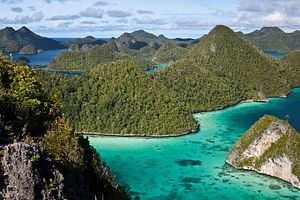Some Thursday ASEAN links:
Rising seas could swallow as many as 1,500 of Indonesia’s islands by 2050, according to a report from the Maplecroft Climate Change Vulnerability Index. It stated that Jakarta’s Soekarno-Hatta International Airport could be underwater as soon as 2030 if the current rate of global warming persists.
“This archipelago’s biggest threat is rising sea levels, where 42 million people living 3 kilometers from the coast are vulnerable if estimated sea level rise reaches up to 90 centimeters by the end of the century,” Ancha Srinivasan, the principal climate change specialist with the Asian Development Bank (ADB), told The Straits Times.
Srinivasan is one of a growing number of scientists, politicians and public figures around the world who are trying to draw attention the adverse effects of climate change on the environment. Both U.S. Secretary of State John Kerry and British Foreign Secretary David King gave speeches in Jakarta recently in a bid to raise awareness. Indonesia, with the world’s second longest coastline, is considered the most vulnerable country in Southeast Asia.
“High poverty and population density levels, along with the concentration of economic assets in areas exposed to extreme events associated with climate change, exacerbate risks in Indonesia,” said the official report.
It added that rainy season floods have increased in intensity due to warmer temperatures that create more moisture in the air. Changing pH levels are also driving fish further out to sea.
According to the Ministry of Marine Affairs and Fisheries, Indonesia already lost 24 small islands between 2005 and 2007.
Across the globe, a popular Philippine fast food chain is entering the lucrative United Arab Emirates market. Jollibee Foods Corporation will expand into the UAE as part of a joint venture deal that was made official yesterday.
“In a disclosure to the Philippine Stock Exchange, Jollibee said wholly-owned subsidiary Golden Plate Pte. Ltd. (GPPL) signed a joint venture agreement with Golden Crown Foods LLC (GCFL) to establish a company that will own and operate Jollibee stores in the Emirates,” said GMA News. “GPPL will own 49 percent of the joint venture while GCFL will own 51 percent, but both companies will practice equal sharing in terms of control and management.”
Jollibee, the largest fast food chain in the Philippines, calls itself “American-style” with a “Filipino influence.” It offers typical on-the-go fare: burgers, fried chicken, spaghetti and rice dishes.
The company has already expanded into Vietnam, Indonesia, Singapore, Brunei, Japan, Hong Kong, China, Qatar, Saudi Arabia and the U.S.
Finally, as protest continue in Thailand, related boycotts of companies liked to beleaguered Prime Minister Yingluck Shinawatra are coming under fire. A group of targeted companies has lost more than $2 billion in market value this week.
Advanced Info Service, a Thai telecommunications provider, has been losing customers daily since protests began. The stock of SC Asset, a property developer, has fallen 9 percent since last Wednesday. Mobile phone distributor M-Link Asia, which Shinawatra once chaired, is down 11 percent.
According to The Wall Street Journal, flagging stocks and general market uncertainty have prompted several overseas companies to put Thai investment plans on hold.

































